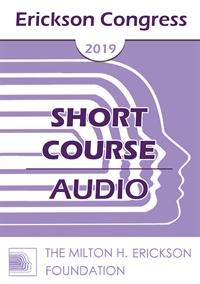IC19 Short Course 15 - The Art of Client-Responsiveness in Hypnotherapy and Psychotherapy - Richard Hill, Master of Brain and Mind Sciences
- Average Rating:
- Not yet rated
- Topic Areas:
- Short Courses | Art and Creativity | Hypnotherapy | Psychotherapy | Therapeutic Relationship | Therapist Development
- Categories:
- Erickson Congress | Erickson Congress 2019
- Faculty:
- Richard Hill, MBMSc, MEd, MA
- Duration:
- 1 Hour 30 Minutes
- Format:
- Audio Only
- Original Program Date:
- Dec 12, 2019
- License:
- Never Expires.
Description
Description:
Hypnotherapy and psychotherapy have been developing over time through various phases. Directive therapies with an intervention orientation have shifted over the years to suggestive and client centered approaches. More recently both research and practice has opened our minds to relational and responsive approaches. The concept of “client responsiveness” is discussed in my book with Ernest Rossi, The Practitioner’s Guide to Mirroring Hands. We are continuing the ideas and practices of Milton Erickson, who was ahead of his time. Many examples of Erickson’s prescience can be found throughout the 16 volumes of The Collected Works of Milton Erickson, edited by Rossi, Rossi and Erickson-Klein. This presentation explores the foundational elements of being client-responsive and how to utilize these concepts in a creative and emergent way. This session will explore i) language principles ii) sensitive observation and iii) improvisational responsiveness. We will both discuss and experience these qualities in a series of activities. These elements, and others we describe in our book, truly allow for the co-creation of a therapeutic experience that fully embraces both the qualities of the therapist and the implicit expertise within the client to mutually discover what needs to be done.
Educational Objectives:
- List and demonstrate various language principles of client responsive therapy.
- Describe and demonstrate practical activities that enhance the therapist’s sensitive observation of the client.
- Describe and demonstrate how to be responsive to the client and co-create the therapeutic experience.
*Sessions may be edited for content and to preserve confidentiality*
Credits
Faculty

Richard Hill, MBMSc, MEd, MA Related Seminars and Products
Richard Hill has emerged from a diverse and fascinating journey to become a successful psychotherapist and an innovative speaker on the mind, brain and the human condition. From a satisfying, if not quite famous, early career in the creative arts, Richard returned to intellectual studies at 42 (1996) beginning with a Bachelor of Arts majoring in linguistics. This triggered a curiosity that led to a diploma in counselling and a new career in psychotherapy. Studying continued and, as of 2014, he has added three Masters degrees – an MA in Social Ecology; a MEd; and a Masters in Brain and Mind Sciences (MBMSc) from Sydney University. Richard is also fortunate to have been mentored by the esteemed Ernest Rossi PhD who has invited Richard into the International Psychosocial Genomics Research Team to study the impact of therapeutic practices on the genetic level.


